'Each soldier was my brother in arms.'
'We fought together and achieved glory for India.'
'We fought on with only one thing in the mind -- that that this is a national battle and we must not let the Pakistanis get the better of us,' says Major General Shamsher Singh,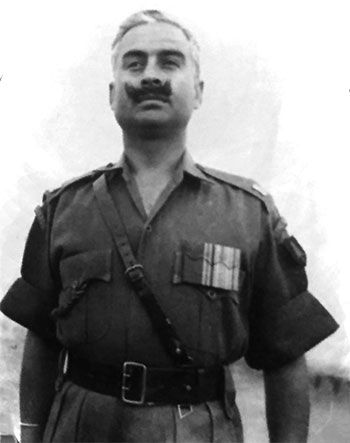 who was awarded the Mahavir Chakra for fighting one of the bloodiest battles the Indian Army has ever fought.
who was awarded the Mahavir Chakra for fighting one of the bloodiest battles the Indian Army has ever fought.
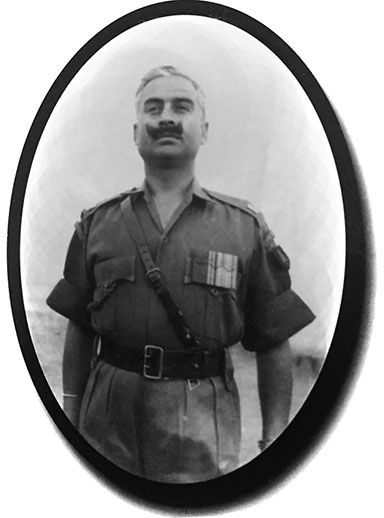
The photograph above is of him as a young major. He joined the Indian Army in 1950.
Photograph: Kind courtesy 8th Battalion, Brigade of the Guards.
Decorated with the Mahavir Chakra, the second highest medal for courage during war, Major General Shamsher Singh is a gentleman soldier. He is modest about the hard fought victory that he and his men accomplished in spite of enormous casualties in the 1971 War.
"Each soldier was my brother in arms. We fought together and achieved glory for India," says General Singh, so distinctly proud of his troops that his eyes glint with pride just as they get moist with emotion thinking about them.
As commanding officer of the 8 Guards, his battalion was chosen to launch the first attack on Pakistan on the night of November 22-23 even before the war was officially declared.
"We fought on with only one thing in the mind -- that this is a national battle. This is the first attack by Indian troops and we must not let the Pakistanis get the better of us," the general recalls.
The battle of Hilli was the bloodiest battle fought in East Pakistan. The battalion lost 68 men -- 153 soldiers were wounded -- but did not fall back until they achieved their objective.
Hilli was so well defended by Pakistani soldiers that every house, every inch of ground was fortified. The Indian troops led by commanding officer then Lieutenant Colonel Shamsher Singh fought a pitched battle.
Officers, junior commissioned officers and jawans shone through with examples of exceptional courage in the Hilli campaign that lasted nearly 20 days.
His inspiring leadership helped the 8 Guards capture six places by the end of the war. His Mahavir Chakra citation pays tribute to his conduct in battle where he engaged in hand to hand fighting, moved from place to place between enemy positions personally directing his troops, and encouraging them to hold on to their positions.
With three Mahavir Chakras, two Vir Chakras and one Sena Medal, the 8 Guards was the most decorated battalion of the 1971 War.
For its exceptional courage in the liberation of Bangladesh, the battalion, commanded by then Lieutenant Colonel Shamsher Singh, led the Republic Day parade in 1972.
As part of Rediff.com's Oral History project on the 1971 War, Archana Masih spent an evening with the war hero to find out what it is to fight a war and why a soldier can never forget the men he has fought a war together with.
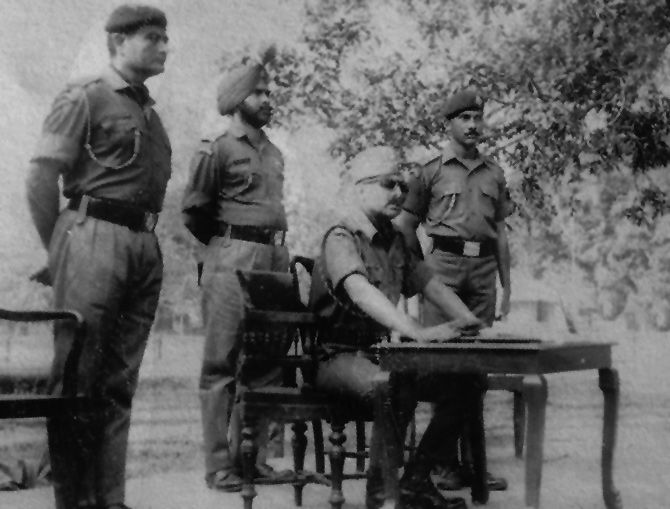
I find it very awkward to speak in praise of my battalion and myself and say we fought and defeated the enemy.
It was a task given to us and we did it as if it was the last thing we would do.
Hilli was the first battle of the 1971 war. This was the bloodiest battle ever fought in East Pakistan.
Hilli is a very famous word today [in the annals of Indian military history.]
It was decided the battle was going to be fought by an entire division (includes 3 to 4 brigades) of the Indian Army because the Pakistanis had reinforced that area in great numbers.
But our superiors felt instead of a divisional attack, a brigade (3 to 4 battalions) would launch an attack. My brigade was chosen to go in.
A day before the attack, it was decided that instead of a brigade, only a battalion (around 800 men) would be launched.
Of all the battalions of the division, my battalion was chosen to launch the first attack on the Pakistani troops on the night of November 22-23.
When we got the information, I can swear that each man of my battalion was overawed by the fact that ours was the first battalion chosen to carry an attack by our country.
It was a national campaign and we were the chosen few. There was nothing that could overawe us.
Casualty or no casualty; Pakistani resistance or no resistance -- with that kind of spirit and without seeking anything, we went in.
We launched our first attack on Noapara, north of Hilli. Pakistan had reinforced that area with a brigade, while we were just a battalion attacking a brigade -- this is something that never happens.
We had no reconnaissance, because Pakistan was not to know. Usually an offensive is carried out after a great deal of reconnaissance -- aerial and on foot -- but here it was not possible because we were not allowed to cross the border.
The border was a railway line. We only crossed it when we launched our attack.
Pakistan on the other side was continuously pushing in troops to reinforce the position.
They were prepared to fight till the last.
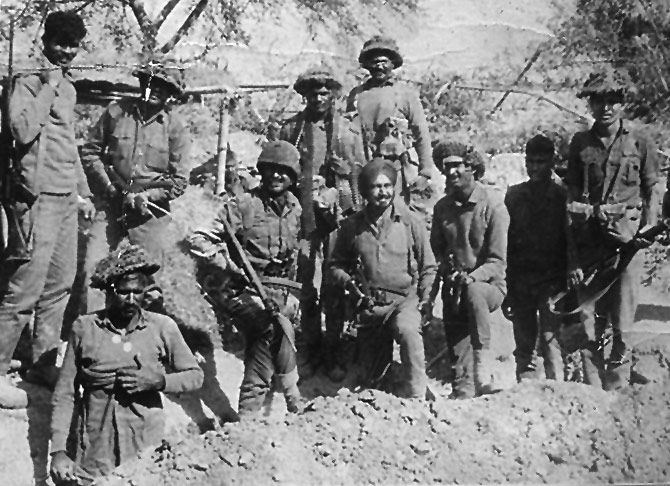
"You can never forget soldiers you have fought a war with," the general says.
We had artillery support but no tanks because the entire area was a swamp. It had paddy fields infested with mines and booby traps.
There were no tracks, so we had to find a way through waist deep water to carry on to the objective.
About two minutes later, the Pakistanis opened deadly fire. By then they knew from which side the attack was coming and were poised to take us on.
We suffered enormous casualties -- officers, junior commissioned officers, soldiers and guardsmen.
When the wounded were taken to the hospital where they were met by General J S Aurora (commander of the Indian Army in the East), a soldier groaning with pain told him: 'Sir you go on to the objective. You will not find a guardsman, JCO or officer who has been shot at from the back.'
The men had taken bullets in the chest which meant that we were determined to fight and defeat the Pakistanis.
The Pakistani never expected that we would come without artillery or tank support. We could not use artillery fire because the distance from Noapara to Morapara was covered by our troops.
Pakistani forces from other parts had also come to reinforce Morapara. The battle went on.
Many changes were made during the night. I remember taking the troops to the north of Morapara, but found the enemy fire power was so strong that we could not cross.
We came back and brought the troops back from the eastern side for which we had to move between the Pakistani positions. We pumped in troops and continued fighting.
By that time there were many casualties, both officers and troops.
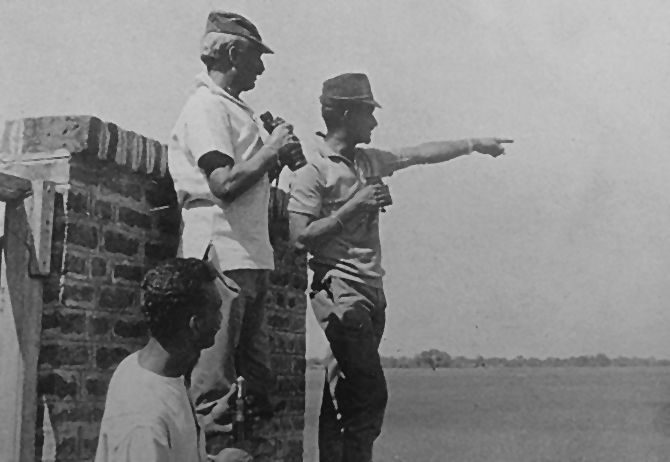
Each officer of mine was a very brave officer. One gets overawed (chokes with emotion). I single them out because they laid down their lives.
If an officer is fighting from the front, his troops fight four times over and above that.
The first officer to lay down his life in battle was Major H D Manjrekar from Bombay. He was badly wounded, but he continued to lead his troops.
He used his last few moments to throw a grenade into the enemy bunker and destroy it. Thereafter, he got a full blooded machine gun burst in his head. He died, but enabled his men to get a foothold.
His position was taken by Lieutenant Shamsher Samra, a young officer who had been sent to my battalion and whom I readily accepted. He was the next person who laid down his life, but after destroying a number of bunkers and killing a number of Pakistanis. He was awarded the Mahavir Chakra.
Another young officer, Lieutenant P N Gupta, who was doing a great job in trying to preserve what we had captured, took that area under his command and tried to take the Pakistanis out till he too was hit and died fighting bravely.
There was Major Rao who was also killed. His position was taken over by Captain Vishnu Sharma. He fought bravely till the end, survived and didn't let the Pakistanis capture that area.
In the meanwhile -- east of Morapara which was also being invested by our troops -- the company was led by young Captain Ravinder Nath, also an excellent officer.
He went in like a bull into the heavily dominated Pakistani position along with his troops. He took a bullet. It went through his chest and shoulder, but he carried on fighting and encouraging his troops to move on. He survived.
A company commanded by one of our senior officers Major P P Singh -- who was later Major General P P Singh -- went through from the eastern side and took hold of the area so that the Pakistanis who had infiltrated from a neighbouring position could not reinforce Morapara.
He cut them out, they were running back. A large number of the enemy were killed and the Pakistanis were evicted from Morapara leaving behind lots of ammunitions and dead. It all happened in one night -- in pitch darkness.
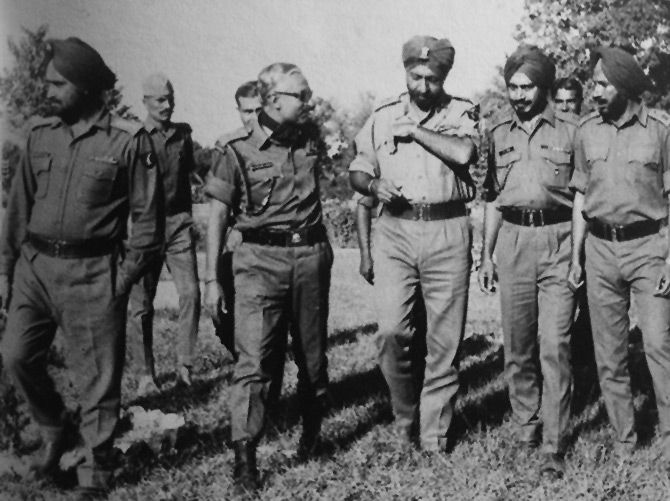
We had suffered heavy casualties after capturing Morapara and I got the order -- 'Well done you have fought a great battle, we would like you to withdraw and recoup.'
I said,'Nothing doing sir. I will not withdraw from here. I have not yet cleared the position of my men who have been killed and are still lying in the minefields.'
I refused to clear (out). He said, "This is an order." I said, "Sir, I do not agree with you."
The GOC (General Officer Commanding Major General Lachchman Singh Lehl) was listening. "Shamsher, you carry on," he said, "but make sure if you are evicted by the Pakistanis, I will never forgive you."
"Over my dead body," I said.
So we went right through with faith in God and in ourselves. We carried on till the very end of the battle.
They were continuously firing, mortar, artillery fire, we would take out patrols to dominate that area and fighting counter attacks almost every night.
The Pakistani commander fighting that battle against us was awarded the highest decoration Pakistan could confer. He was believed to have been killed. The rest of the Pakistani troops withdrew into neighbouring Chandipur.
Why we were moving so fast and not stopping to regroup or reorganise was because the Pakistanis had already started moving their troops rapidly and we had to get into Morapara before they did.
We managed; we stopped them, and they withdrew.
Their tanks came, their air force came -- we couldn't care less.
We fought on with only one thing in the mind that that this is a national battle and we have to fight.
This is the first attack by Indian troops and we must not let the Pakistanis get the better of us.
Our tanks could not come into that area because there was a huge bog, nothing could move.
Pakistan employed its tanks. We shot two of their tanks by recoilless guns that were carried by my men under the command of one of my gallant officers Major Iqbal Singh (later major general).
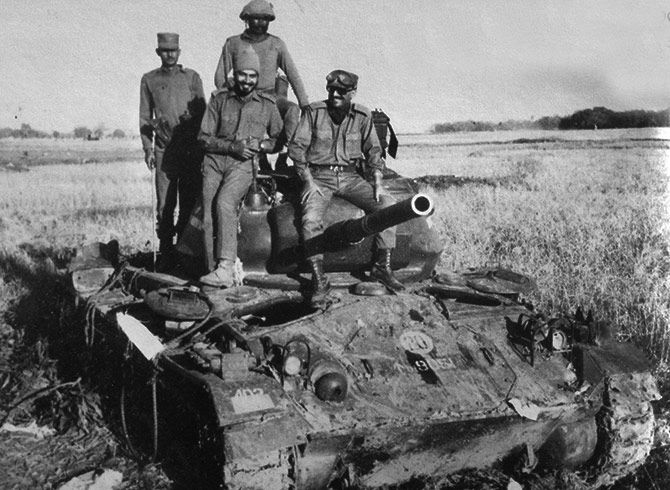
We held on to Morapara up to December 11.
During this period we took care of our dead, they had to be cremated, had to be removed from the minefields.
My second in command Major S K Chaudhuri (later major general) received, cremated and buried all the casualties personally -- one by one. The adjutant Captain P T Ghogale (later brigadier) worked day and night communicating to others. All the men were so committed to the battalion.
There were mines all over and the Pakistanis launched counter attack after counter attack on our positions in Morapara.
We carried on fighting and they carried on attacking us.
We launched attacks on numerous positions. Each of these positions were held very strongly by the Pakistanis.
We moved on company by company -- something many armies would not think of -- fighting a superior enemy with a mere battalion, or a mere company, but we carried on till the last position Dangapara had been captured by one of my gallant officers Major S S Saini (later brigadier).
After the last position had been captured, General Lachchman Singh Lehl, who was actively involved, personally came to congratulate us and told us "Well done!"
"Shamsher, what's your plan?" he asked. "We are moving on to Rangpur," I said. "Fine," he said, "carry on."
By the time the Pakistanis surrendered we were moving towards Rangpur.
We reached a river. The Pakistanis were occupying a position there and as soon as they saw us coming in full force, they raised the white flag.
In Rangpur we were welcomed by the nuns who had come out of the church -- to care for us and look after us.
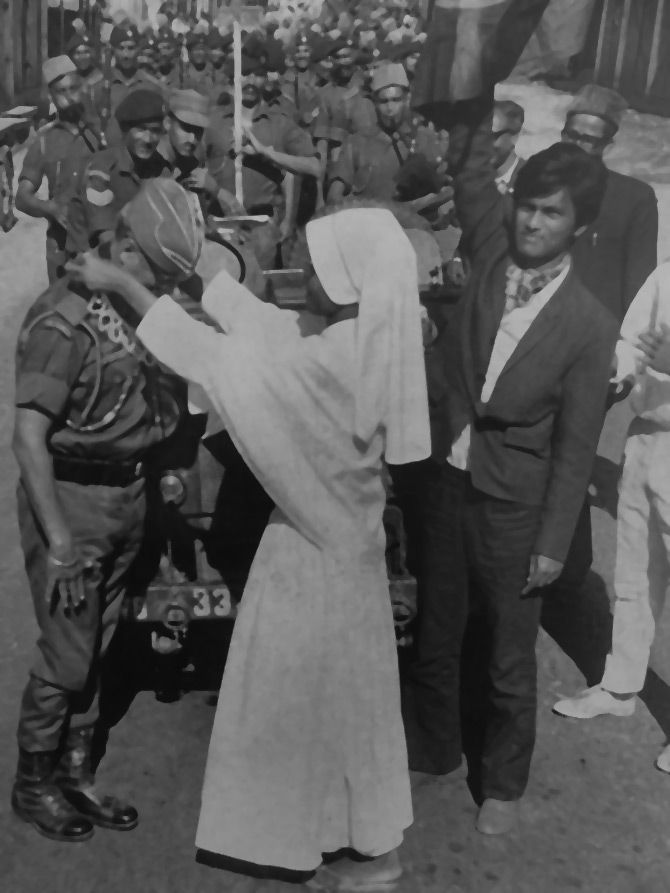
The battle started from November 22-23 night up to December 11. It was deadly.
We captured Noapara, Morapara, Chandipur, Hakimpur, High School and Dangapara. We fought six battles.
The only thought in our minds was that we are fighting for our country. We have to ensure we will win and Pakistan will not beat us and we carried on.
My battalion was highly decorated in that operation. Our battalion had become the most decorated battalion -- we had 3 Mahavir Chakras and various other awards. It is known as the triple MVC battalion.
After the war we came to Delhi and participated in the Republic Day parade. The parade usually features contingents from various battalions -- but this time the whole battalion marched.
If you see various actions fought by the Indian Army, any war in Kashmir, Rajasthan or Punjab, officers lead their troops.
The battalion commander is not supposed to sit in his bunker, he goes in with his troops. If he has good luck, he survives. If he doesn't, he doesn't.
There was my intelligence havaldar who was following me. I was walking ahead through waist deep water. He was behind me -- I crossed, but he stepped on a mine. He was wounded badly, but he survived.
In another instance, I still remember I was standing with artillery forward observation OP and a shell landed between us. His stomach came out, he was hit in his legs, but nothing happened to me.
Till destiny decides, you can carry on through whatever fire.
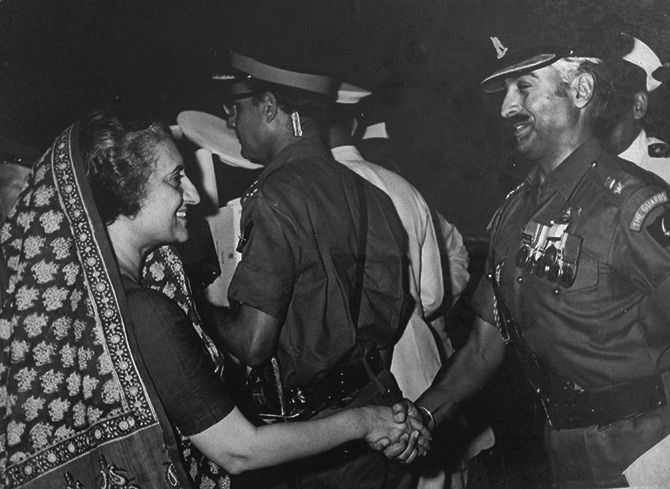
Today we can only look back on those days -- all my troops who fought.
Each soldier was my brother in arms. We fought together and achieved glory for India.
The leadership during the War played a great role starting with General Sam Manekshaw at the top. General Aurora, General J F R Jacob, General Lehl, Brigadier Farhad Bhatty, General Sagat Singh. They had the operational plans and encouraged young officers on the ground. It was a chain reaction.
General Aurora would come and speak to the troops. General Lehl, who won a Vir Chakra in the 1965 War, was right at the frontline.
There were about 800 men in my battalion. I lost about 68 men. What is satisfying and one feels proud about is that each officer, JCO, other ranks excelled.
He fought a battle as if it was the last thing he would ever do.
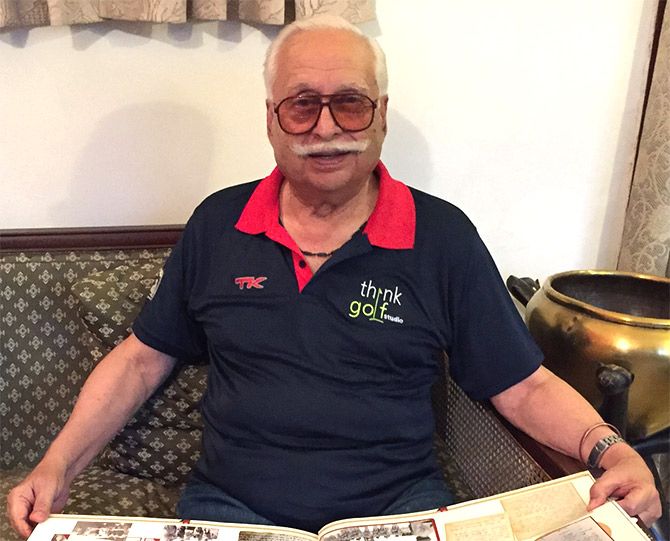
Major Gen Shamsher Singh, MVC, retired from the Indian Army in 1990 after 40 years of distinguished service.
While he was fighting the war in the Eastern Theatre, his brother Lieutenant Colonel Harkirat Singh was at the frontlines of another bloody battle in the West -- in Chhamb, Jammu and Kashmir. He was later promoted to major general and commanded the Indian Peace Keeping Force in Sri Lanka.
General Singh remembers each of his postings which include Baramullah in Kashmir, Dera Baba Nanak on the Punjab border, Nagaland, and Ladakh, where he commanded a brigade in high altitude.
General Singh was the GOC, 19 Division in Kashmir and Chief of Staff 10 Corps at Bathinda.
He has represented the Indian Military Academy, Punjab and the Services in the Ranji Trophy. He is also a glider pilot and national level skier.
The war hero lives in a 100-year old house in Dehradun with his family and enjoys golf in the afternoon.









